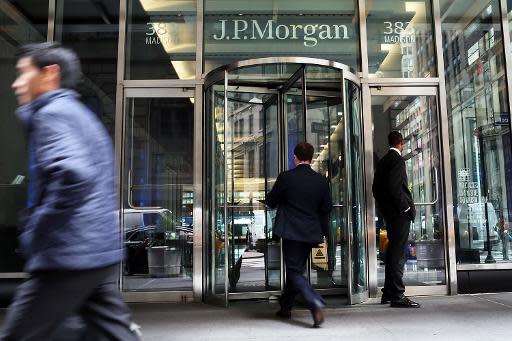JPMorgan to pay $1.7 bn to victims of Madoff Ponzi fraud

JPMorgan Chase will pay $1.7 billion to victims of the mammoth Madoff Ponzi scheme to settle charges it failed to adequately police the Madoff accounts, US authorities announced Tuesday.
The US bank agreed to make the payment to resolve criminal charges over its role in the 2008 Madoff scandal, the largest ever financial fraud to rock Wall Street.
The government called it the largest penalty for a violation of the Bank Secrecy Act.
US Justice authorities said that, as the bank Bernard L. Madoff Investment Securities used "almost exclusively" for more than 20 years, JPMorgan (and predecessor banks) had failed to flag to regulators the suspicions that employees had expressed over his fraudulent activities.
Once a prominent Wall Street broker and chairman of the Nasdaq exchange, Madoff was arrested in December 2008 for fabricating account statements for tens of billions of dollars he managed.
His firm, Bernard L. Madoff Investment Securities, collapsed with just $300 million in assets, after having reported $65 billion. The savings of many investors, foundations and families were wiped out in the collapse, and efforts continue to claw them back.
After admitting that his firm was a Ponzi scheme, Madoff was sentenced to a 150-year prison sentence.
Under the deferred prosecution agreement announced by the New York US Attorney Tuesday, JPMorgan admitted that it failed to maintain an effective money-laundering program and violated the Bank Secrecy Act by failing to file a suspicious activity report on Madoff.
The authorities said they will dismiss the criminal charges after two years if the bank complies with the provisions of the deal: paying the $1.7 billion penalty, reforming its anti-money laundering policies, cooperating with ongoing investigations and reporting any wrongdoing by JPMorgan or its employees.
A JPMorgan statement characterized the Madoff scheme as "an unprecedented and widespread fraud that deceived thousands, including us, and caused many people to suffer substantial losses."
"We recognize we could have done a better job pulling together various pieces of information and concerns about Madoff from different parts of the bank over time," JPMorgan said.
"We do not believe that any JPMorgan Chase employee knowingly assisted Madoff?s Ponzi scheme."
Over the years a number of JPMorgan employees spotted questionable dealings, but the bank never filed a "suspicious activity report" with the US Treasury, the US said.
In one example, between 1994 and 2003 Madoff and another private client of JPMorgan's private bank engaged in a daily "round trip" scheme of multi-million dollar check deposits and withdrawals with no apparent purpose but to artificially increase the balance of Madoff Securities' account at the bank, and to force the bank to make inflated interest payments to Madoff.
While the bank was aware of the activity -- another bank involved had concluded it appeared to be a "check kiting" scheme -- JPMorgan never alerted regulators.
In another case, a JPMorgan senior investment officer was asked by a client to query Madoff on how he generated consistently high returns despite a volatile market.
The JPMorgan officer concluded Madoff might have been "smoothing out the returns" by sharing trading profits from other Madoff accounts.
Tuesday's penalty comes on the heels of other recent major settlements involving JPMorgan, including a $13 billion agreement to resolve it misled investors on the sale of mortgage securities and more than $1 billion to settle charges it failed to detect and prevent billions of dollars of losses in a fraudulent trading scheme.

 Yahoo Finance
Yahoo Finance 